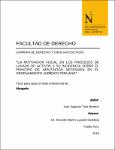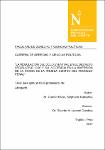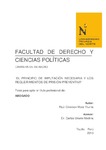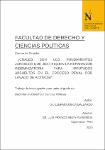| dc.contributor.advisor | Luperdi Gamboa, Ricardo Martín | |
| dc.contributor.author | Tam Moreno, Ivan Augusto | |
| dc.date.accessioned | 2018-06-11T15:00:45Z | |
| dc.date.available | 2018-06-11T15:00:45Z | |
| dc.date.issued | 2018-05-21 | |
| dc.identifier.citation | Tam, I. A. (2018). La motivación fiscal en los procesos de lavado de activos y su incidencia sobre el principio de imputación necesaria en el ordenamiento jurídico peruano [Tesis de licenciatura, Universidad Privada del Norte]. Repositorio de la Universidad Privada del Norte. https://hdl.handle.net/11537/13429 | es_PE |
| dc.identifier.other | 345.0268 TAM | es_PE |
| dc.identifier.uri | https://hdl.handle.net/11537/13429 | |
| dc.description.abstract | En este estudio, se ha examinado, aunque mas sincero seria decir que se ha intentado
examinar la motivación fiscal en los procesos de lavado de activos y su incidencia sobre el
principio de imputación necesaria en el ordenamiento juridico peruano, como un modo de
garantizar el principio de imputación necesaria en el proceso penal.
En ese contexto, para la concreción del mencionado objeto, en el primer capítulo, fueron
desarrollados de manera preliminar el delito fuente y el delito de lavado de activos en sus
apectos generales y esenciales de acuerdo a la doctrina, jurisprudencia y argumentos
esgrimidos por el Tribunal Constitucional. Asimismo el desarrollo del delito fuente su
importancia e implicancia en el proceso de lavado de activos.
En el segundo capítulo se abordó sobre el desarrollo de la motivación frente a una
necesidad básica de dar una explicación clara con decisiones altamente suficientes y
concretas de corte jurisdiccional cumpliendo los requisitos formales y de fondo,
constituyendo un derecho básico al conjunto de razonamientos de hecho y de derecho
sobre una controversia en específica para una correcta garantía esencial del imputado.
En esa línea de ideas, se abordó el estudio sobre la motivación en el delito fuente, es
decir su sistemática de acuerdo a las máximas reglas de la experiencia y la lógica,
referente a cómo se está llevando a cabo su interpretación y su valoración hoy en día en
nuestra realidad, siendo el delito fuente la piedra angular dentro del proceso de lavado de
activos.
En el tercero y último capitulo se abordó respecto al desarrollo del principio de imputación
necesaria su estructura como derecho fundamental de protección, su contenido esencial y
el replanteamiento de la mencionada fundamentalidad desde una perspectiva
hermenéutica, indicando que la fundamentalidad del referido principio está determinada
por una garantía procesal y sustantiva al que pertenece al nuevo sistema penal.
En ese sentido el presente trabajo de investigación, fue confrontado con el estudio de
casos, donde se aprecia la valoración de los requerimientos acusatorios decretados, a fin
de poder determinar la incidencia entre el uso de esta y la debida motivación acorde a las
garantías constitucionales que se exige en aras de proteger al imputado.
A través del marco teorico elaborado en la presente investigación, asi como los materiales
y métodos utilizados, consistentes en entrevistas realizadas a abogados y fiscales
especializados en lavado de activos, análisis de requerimientos acusatorios, se logró
determinar y corroborar el planteamiento de la hipótesis formulada, siendo que la
motivación del delito fuente en los requerimientos acusatorios por los delitos de lavado de
activos incide negativamente sobre el Principio de Imputacion Necesaria, puesto que la
parte afectada (imputado) no posee el derecho de defenderse correctamente, debido a
una falta de motivación del delito previo, contraviniendo de esta forma el principio de
objetividad fiscal así como el Principio de Imputación Necesaria, regulado en el
ordenamiento jurídico peruano.
Tras todo este iter transcurrido, se pudo arribar a la conclusión de que la motivación en el
delito fuente en los requerimientos acusatorios por los delitos de lavado de activos, a
través de sus presupuestos ya sean procesales o sustantivos, incide negativamente en el
principio de imputación necesaria en el proceso penal. | es_PE |
| dc.description.abstract | In this study, it has been examined, although it would be more accurate to say that it has
been tried to examine the motivation of the source crime in the accusatory requirements
for the crimes of laundering of assets and its incidence on the principle of imputation
necessary in the Judicial District of La Libertad during the period 2011-2016, as a way of
guaranteeing the principle of imputation necessary in criminal proceedings.
In this context, in the first chapter, the source crime and the crime of money laundering in
its general and essential aspects were developed in a preliminary manner in accordance
with the doctrine, jurisprudence and arguments put forward by the Court Constitutional.
Also the development of the crime prior its importance and implication in the process of
money laundering.
The second chapter dealt with the development of motivation against of a basic need to
give a clear explanation with highly adequate and concrete decisions of jurisdictional court
fulfilling the formal and substantive requirements, constituting a basic right to the set of
factual and of law on a specific dispute for a correct essential guarantee of the accused
In the third chapter the study on the motivation in the source crime, that is to say its
systematics according to the maximum rules of the experience and the logic, was
approached as referring to how it is carrying out its interpretation and its appraisal
nowadays in our reality, referring to the base crime that is the cornerstone of the money
laundering process.
The fourth and last chapter dealt with the development of the principle of imputation
necessary its structure as a fundamental right of protection, its essential content and the
rethinking of the aforementioned fundamentality from a hermeneutic perspective,
indicating that the fundamentality of said principle is determined by a procedural and
substantive guarantee to which belongs to the new penal system.
In this sense, the present research was confronted with the case study, which evaluates
the assessment of the accusatory requirements decreed, in order to be able to determine the incidence between the use of this and the proper motivation according to the
constitutional guarantees that is required for the sake of protecting the accused.
Throught the theoretical framework elaborated in the present investigation, as well as the
materials and methods used, consisting of interviews with lawyers and prosecutors
specialized in money laundering, analysis of accusatory requirements, it was possible to
determine and corroborate the hypothesis approach formulated, being that the motivation
of the prior offense in the accusatory requirements for money laundering offenses has a
negative effect on the Principle of Necessary Imputation, since the party affected (imputed)
does not have the right to defend itself correctly, due to a lack of motivation for the crime
previous, thus contravening the principle of fiscal objectivity as well as the Principle of
Necessary Imputation, regulated in the Peruvian legal system
After all this interval, it was possible to conclude that the motivation in the source crime in
the accusatory requirements for the crimes of money laundering, through its budgets is
procedural or substantive, negatively affects the principle of imputation necessary in the
process. | es_PE |
| dc.description.uri | Tesis | es_PE |
| dc.format | application/pdf | es_PE |
| dc.language.iso | spa | es_PE |
| dc.publisher | Universidad Privada del Norte | es_PE |
| dc.rights | info:eu-repo/semantics/embargoedAccess | es_PE |
| dc.source | Universidad Privada del Norte | es_PE |
| dc.source | Repositorio Institucional - UPN | es_PE |
| dc.subject | Delitos económicos | es_PE |
| dc.subject | Poder Judicial | es_PE |
| dc.subject | Derecho penal | es_PE |
| dc.subject | Aspectos jurídicos | es_PE |
| dc.subject | Ministerio Público | es_PE |
| dc.title | La motivación fiscal en los procesos de lavado de activos y su incidencia sobre el principio de imputación necesaria en el ordenamiento jurídico peruano | es_PE |
| dc.type | info:eu-repo/semantics/bachelorThesis | es_PE |
| thesis.degree.grantor | Universidad Privada del Norte. Facultad de Derecho y Ciencias Políticas | es_PE |
| thesis.degree.level | Título Profesional | es_PE |
| thesis.degree.discipline | Derecho y Ciencias Políticas | es_PE |
| thesis.degree.name | Abogado | es_PE |
| dc.publisher.country | PE | es_PE |
| dc.subject.ocde | https://purl.org/pe-repo/ocde/ford#5.05.01 | es_PE |
| thesis.degree.program | Pregrado | es_PE |
| dc.description.sede | Trujillo El Molino | es_PE |
| renati.advisor.dni | 42424456 | |
| renati.advisor.orcid | https://orcid.org/0000-0002-8226-5322 | |
| renati.author.dni | 73065545 | |
| renati.discipline | 421056 | es_PE |
| renati.level | https://purl.org/pe-repo/renati/level#tituloProfesional | es_PE |
| renati.type | https://purl.org/pe-repo/renati/type#tesis | es_PE |






